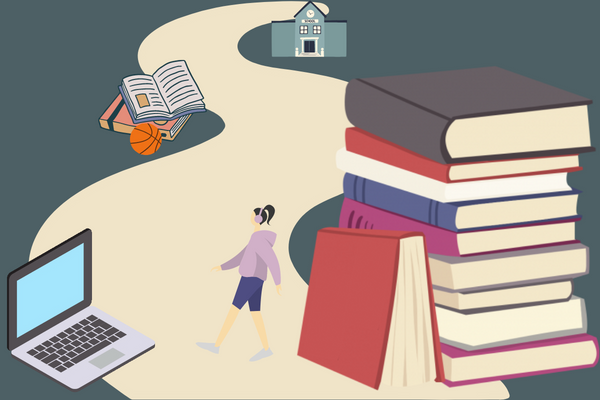How do you measure the path to education? You can’t, because education is a lifelong pursuit.
Former Harvard president Dr. Drew Faust said, “Education is lifelong because what you don’t know will always exceed what you do.”
Take, for example, the various paths one might take before ultimately ending up at retirement. A high school student might choose to take certain classes, participate in certain clubs, and hang out with certain people because that is what sounds interesting to them.
Then, they would probably take some path toward finding a career, finish school and join the workforce, only to change that career path in a few short years. Your path to education includes endless possibilities throughout high school, postsecondary school, and even a career.
The Wide Range of Education in High School
High schoolers, you probably think that there is one path alone through high school that you’re stuck to, and you can’t wait to get out. You’re not entirely wrong, but you might not be considering the many areas in which you do have a choice.
You do get to choose which sports to play, which clubs to participate in, which scholarships to go for, and the ways in which you will get involved with the community. These all play a big role in your path to education and your growth as a person before you graduate.
One great example we’ve come up with recently is Bryce Valley’s Spanish club. It helps kids of all kinds of backgrounds to get involved and have a voice in their community. Members of the club talked about how its impact would stretch beyond just their high school education, but would help to educate a whole community about different cultures.
Different Mediums for Postsecondary Education
But after high school, what’s the next step?
The path to education can be exciting to anyone if it appeals to their style of learning and engaging with the world. For many, that means college. For a good deal of others, that means trade school, online school or apprenticeships.
I knew so many people in college who were stuck because they were in the wrong medium. They didn’t seem to like any of their classes; instead, they were always complaining.
I would argue that these probably shouldn’t have been at college and should have gone to a trade school instead. Someone convinced them that college was the only way to become “educated,” so that’s what they did.
But, as Hailee pointed out in her article, trade schools have just as many pros and cons as any other path to education. And which medium you choose has more to do with what you do with the knowledge gained, rather than how you gained it.
Continuing into Adulthood
Continuing past your traditional education, you never have to stop gaining knowledge.
Many careers require constant education, especially in industries that are always changing. Anyone working online must continue to learn and keep up with trends and algorithm updates. Anyone working with humans or animals must be adaptable to different situations or new research into methods for teaching, herding and growing.
But even if your career doesn’t require that continuous growth, you can still grow as a person. You can do this by continuing to read, listen to different perspectives, and just be curious.
Most importantly, one path to education isn’t a one-and-done. What we know about the world is constantly changing. People are constantly offering new perspectives. When it comes to becoming educated, I try to live by Dr. Faust’s words. “Education is not a destination,” she said. “Education is a process and a vocation: always a work in progress.”
Whether you’re in sports, clubs, college, trade school, parenthood or a career, once you start to become educated, don’t stop!
– by Abbie Call
Feature image caption: The path to education is lifelong and is often not as linear as one thinks it should be.

Abbie Call – Cannonville/Kirksville, Missouri
Abbie Call is a journalist and editor at The Byway. She graduated in 2022 with a bachelor’s degree in editing and publishing from Brigham Young University. Her favorite topics to write about include anything local, Utah’s megadrought, and mental health and meaning in life. In her free time, she enjoys reading, hanging out with family, quilting and hiking.
Find Abbie on Threads @abbieb.call or contact her at abbiecall27@gmail.com.

